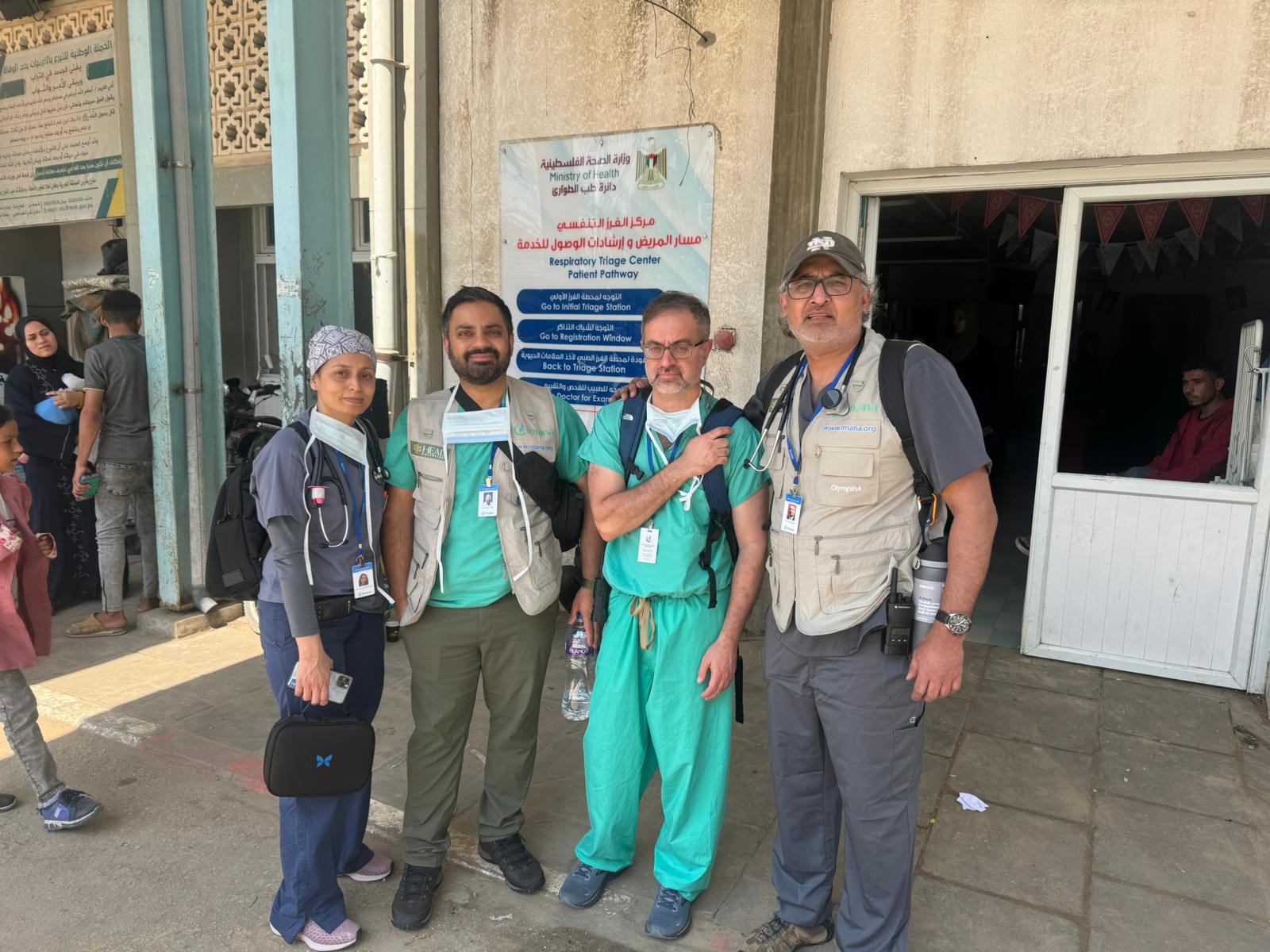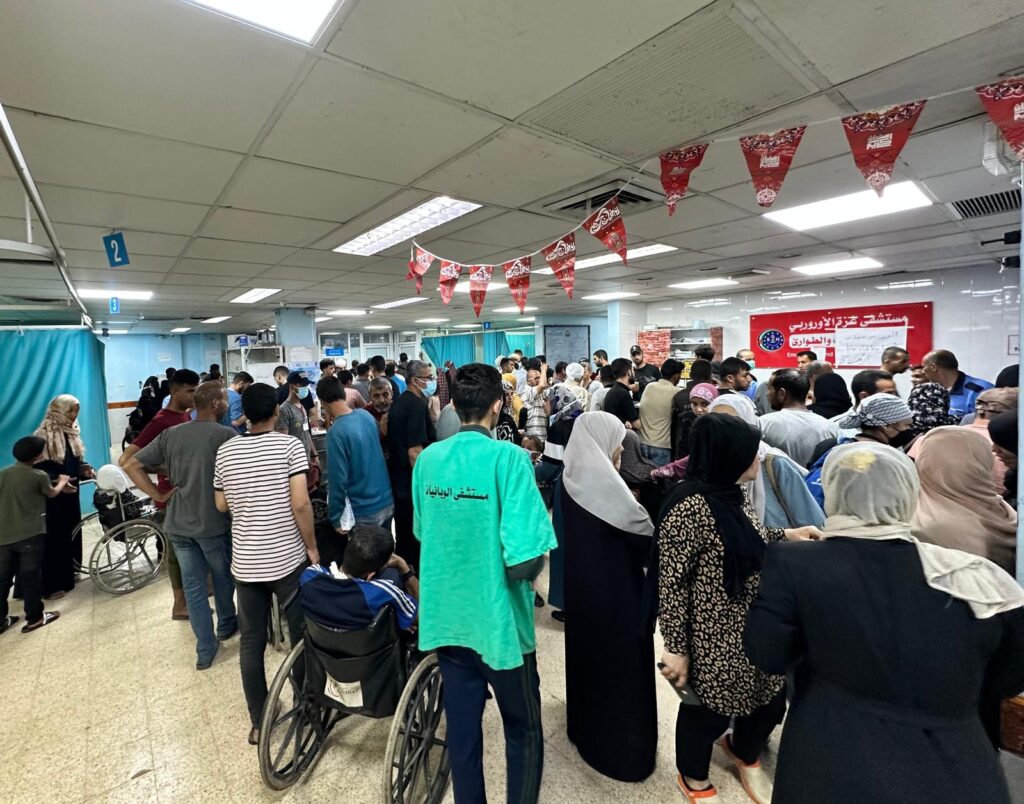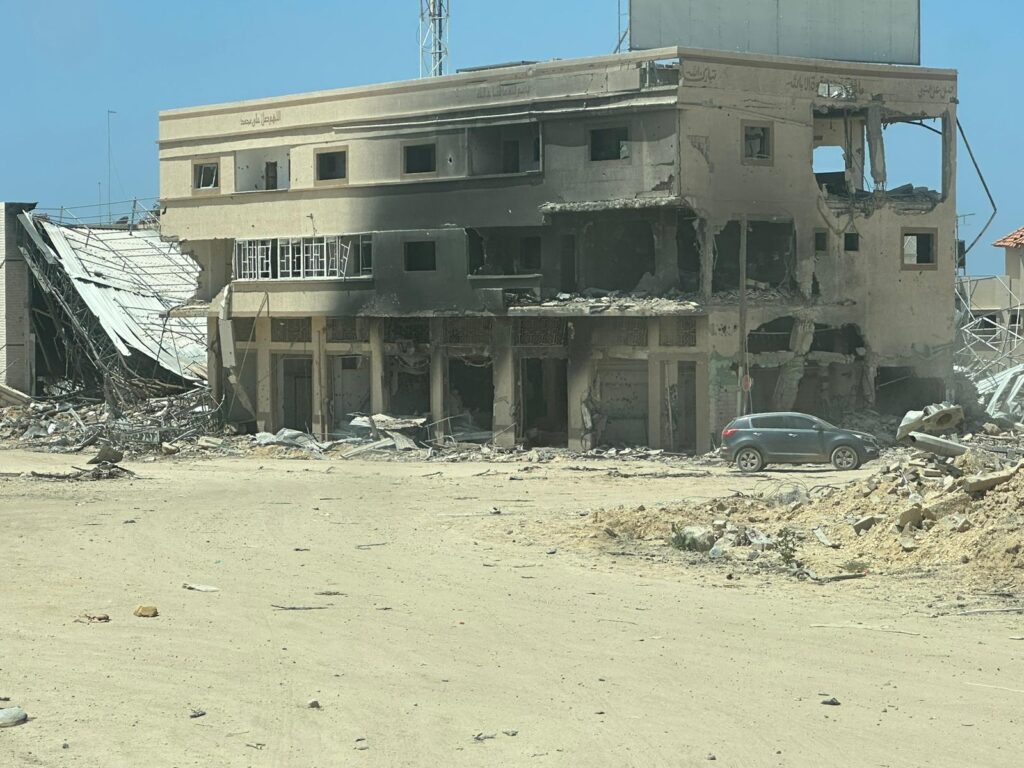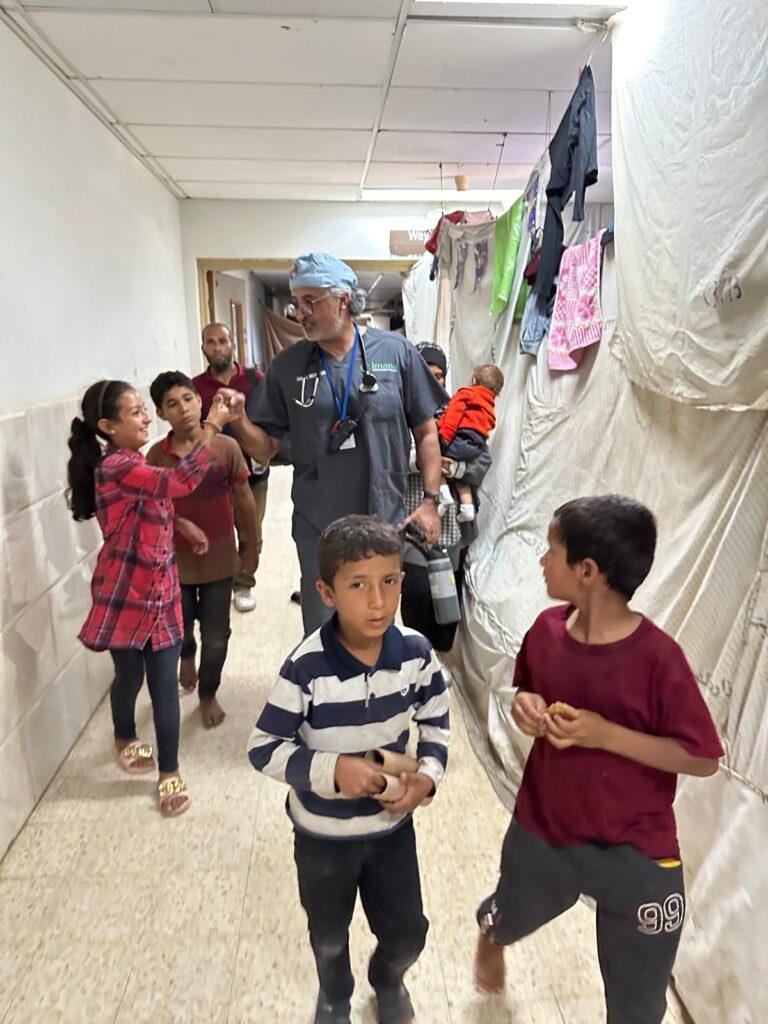Muslim American Doctors Return from Medical Mission in Gaza
By Kiran Ansari
July/Aug 2024

Four doctors. 42 bags. 2,000 pounds of supplies. One mission.
As they entered Gaza, they heard the drones buzzing. From maghrib to fajr they heard artillery being fired from tanks. They were not new to serving in medical missions or even new to Gaza. But the Gaza they saw during April 2024 was new to them.
“It was apocalyptic,” said Azeem Elahi, MD, a pulmonary and critical care specialist. “Nearly everything was destroyed or crumbling.”
The level of destruction they saw is nothing compared to their 2009 Gaza medical mission. In 2024, their room shook every night due to the bombs exploding nearby. That was their wake-up call to head straight to the emergency room to deal with the influx of patients.
Anesthesiologist Ismail A. Mehr (member, ISNA’s Founders Board; chair, IMANA Medical Relief), in collaboration with HEAL Palestine (Health, Education, Aid, and Leadership Palestine; www.healpalestine.org/), led the latest IMANA mission. He has been on 36 global medical missions so far. In addition to Elahi, his handpicked team included emergency medical doctor Kanwal Chaudhry, MD, and vascular surgeon Shariq Sayeed, MD.
“We chose the most experienced and veteran team,” Mehr said. “It’s critical in an active conflict area to have a team who can work in a high stress environment and remain focused. Many want or feel the need to volunteer and be in Gaza, and though that is admirable, Gaza presently isn’t for everyone.”
Leaving for Gaza: Sandwiched by Bravery
These veteran health-care professionals knew what they were signing up for. As serving in an active war zone entails a lot of risk, members updated their wills and Mehr ensured that if they were killed, they would be buried back home so their families would have closure.
“Our intention is always to be of value,” said Mehr. “In 2009, I was younger and more emotional. Now I know IMANA’s main goal is to establish sustainable and impactful work, so we worked through several logistical issues to finally get through the approval process. Our connections over the years helped. We wanted to lay the framework for future medical teams too.
“Of course, my family was concerned, but they were also very proud,” he continued. “I was so sad and angry after the genocide unfolded from Oct. 7, that this mission gave me purpose. My family knew going there would be like therapy for me. IMANA doesn’t just go to one place and leave.”
Sayeed, who also grew up with ISNA, shared that his 9-year-old daughter was emotional to see her Baba leave. With spotty Wi-Fi and time difference, it wasn’t always possible for him to stay in touch.
“In 2009 I was scared to tell my parents I was going to Gaza,” remarked Chaudhry. “In 2024 I wasn’t. My parents were immediately proud of me. I didn’t FaceTime with them, as I was hoping the out-of-sight-out-of-mind tactic would work rather than them being reminded I was in an active war zone.”

room which, is seeing approximately
800 patients per day.
Just a few weeks before the mission, Elahi was sitting at jummah with his father and son, when it struck him that three generations of Elahis have been listening to the stories of injustice in Palestine. He felt compelled to help.
Sandwiched between brave parents and brave children, these dedicated doctors finalized plans.
As word got out, people donated so much that they were able to fill personal luggage of 42 bags with around 2,000 pounds of surgical equipment, cardiac monitors, portable ultrasounds, antibiotics and wound-care supplies. They also packed food so they wouldn’t have to depend on Gaza’s limited food supplies, and distributed some supplies to the Shuhada’ al-Aqsa and Kuwaiti hospitals.
“It was basically protein bars and Ramen noodles, but we were so busy that sometimes we didn’t even remember to eat,” Chaudhry said.
Martyred Limbs are Waiting for us in Jannah
When Elahi left for Gaza in 2019, there was a full medical staff there waiting to be trained. “To say the current healthcare system is fractured is false. It has collapsed. Yet the amazing local physicians and staff find ways to keep going as they have no choice. Most of the hospitals in northern and central Gaza have either been destroyed or are operating in the Middle Ages. Historically there has been some scaffolding to build upon. Right now, it is piles of indiscriminate crumbled cement.”
Gaza’s European Hospital, where they served for nine days, is the only functioning hospital left in southern Gaza. Its usual capacity is 200 inpatients; now, around 30,000 displaced people are living on its grounds. Its stairways and corridors are all lined with people and tents.
Many of Gaza’s senior doctors have fled or been detained, martyred or buried under the rubble. The IMANA team sought to train the younger ones, many of whom had been training at al-Shifa hospital before it was destroyed.
Nearly everyone they met had lost multiple family members. But still… Even the word “resilience” falls short for them.
“There was nothing similar in the 2009 and 2024 missions except for the resilience of the Palestinians,” Sayeed remarked. “It is a disservice to try to describe their resilience and warmth. I never once heard anyone complain to me about their situation or difficulties even during the most difficult times and losses they have experienced.”
“They were more concerned about our food and safety than themselves,” said Mehr. “They never cursed or complained. They kept repeating ‘This is Allah’s will, and we will get through it.’”
“Even when they lose a limb, they say my leg was shaheed (martyred). I will get it back in jannah,” said Chaudhry. She was an asset to the team, as many female patients preferred that she perform some procedures or exams for religious and modesty reasons.
“I have worked for 17 years in the ER, but here in the U.S. the nurses do a lot of the actual nitty gritty. With extremely limited staff in Gaza, we all had to do far more.”

team traveled north to another local hospital,
Shuhada al-Aqsa Hospital, in desperate need
of supplies
As a woman was rushed into the ER with injuries to her face from an explosion. She just kept saying, “Save my child.” Her husband and another child had already been martyred, but she kept saying Alhamdulillah. “We are so behind in our faith,” Chaudhry said. “We stub our toe and don’t stop complaining.”
According to Elahi, “They are the chosen ones. Allah has chosen them. Their level of iman is unmatched. The doctors in Gaza have not had a day off since October 7. They are truly special people driven by a holier purpose. My favorite part was seeing all healthcare professionals like doctors, nurses, lab technicians and cleaning staff work, pray and eat as a family. In America, medical teams are often segregated in non-clinical settings, such as [at] mealtimes.”
The IMANA team has fond memories of Gaza’s children who waited for them every day. They tried to converse in English. “There is a universal language which breaks all barriers — love,” Mehr stated. “These children made our days easier by bringing smiles and laughter and reinforcing that we too, as healers, needed to be resilient.”
“Even though we didn’t have to operate without anesthesia as our colleagues needed to initially when the ground invasion began, we did have to change open wound dressings on the floor with minimal or no anesthesia,” noted Sayeed. “In the U.S., such dressing changes are only done with pre-medication.”
The thing that struck Sayeed the most was how many children he had to see. “There is no such thing as a pediatric vascular surgeon in the United States. Vascular disease usually affects older people, as it takes time to develop the disease. I don’t see 14 and 16-year-olds with trauma wounds while rounding here in Atlanta.”
He was really looking forward to transferring 11-year-old Yassin to Atlanta. But with the Rafah border closing, things are now in limbo. He hopes Yassin can make it sooner rather than later so he can escape the high infection rate in Gaza.
What Next? Watching and Waiting
Upon her return to rural Illinois, Chaudhry went out for dinner with her coworkers to share details about her trip. She feels that middle Americans have stuck their heads in the sand. It’s convenient for them not to find out what’s happening “over there.” However, the dinner did have an impact. She feels that her coworkers are more engaged with the campus protests because they personally know someone who has been to Gaza. They don’t have the excuse of “we don’t know what to believe” anymore because they are getting a firsthand account from someone they trust.
IMANA had planned on sending another medical mission in May/June, but because of Israel’s invasion of Rafah — Gaza’s lifeline — has been placed on hold for now. As part of the WHO’s briefings, they are monitoring the situation. Medical teams from Fajr Scientific and Palestine American Medical Association have U.S.- and U.K.-based doctors currently stuck in Gaza.
“This could have been us,” said Elahi. “As our lead [Mehr] carried a tarp and duct tape in case one of us was injured and needed to evacuate. It may sound morbid, but we had to plan for everything.”
Mehr felt his team (and their families) had entrusted themselves to IMANA. So, he went through dozens of scenarios in his mind and formulated a crystal-clear action plan. Not until they were all on their way home did their operation’s magnitude really dawn upon him.

Gaza Hospital, fist bumps a young girl, Nida, who is living in
the hospital with her family
The team still cannot forget Hala, a beautiful four-year old girl who suffered 30-40% burns from the waist down. They were really hoping to evacuate her to Boston Shriners Hospital. She’d been transferred to Rafah’s IMC hospital for evacuation. All her paperwork, permissions and approval from the U.S. State Department were in place. Then Israel invaded, and the opportunity disappeared.
Hala died on May 8.
Her story is just one of thousands, each one of which is more devastating than the last. The IMANA team’s message to the ummah is to please continue to speak up, make dua for the stranded medical teams and continue sharing and advocating for an immediate and permanent ceasefire.
Even though none of these four doctors had Palestinian roots, they each left a piece of themselves there. Chaudhry remains in touch with some people in Gaza. When she asks them how they are doing, they reply, “We are alive.” She is ready to go back as soon as possible.
“Just tell me when.”
You can support more such medical missions at www.imana.org
Kiran Ansari (assistant editor, Islamic Horizons) is in awe of the dedication of medical professionals choosing to risk their lives to serve in Gaza. She hopes to visit a free Palestine one day.
Tell us what you thought by joining our Facebook community. You can also send comments and story pitches to [email protected]. Islamic Horizons does not publish unsolicited material.
